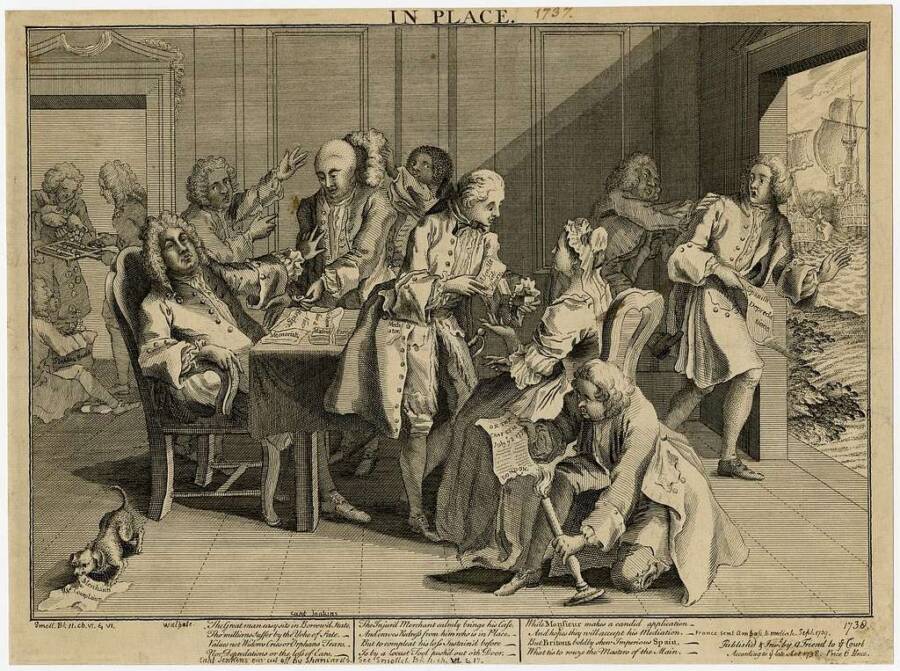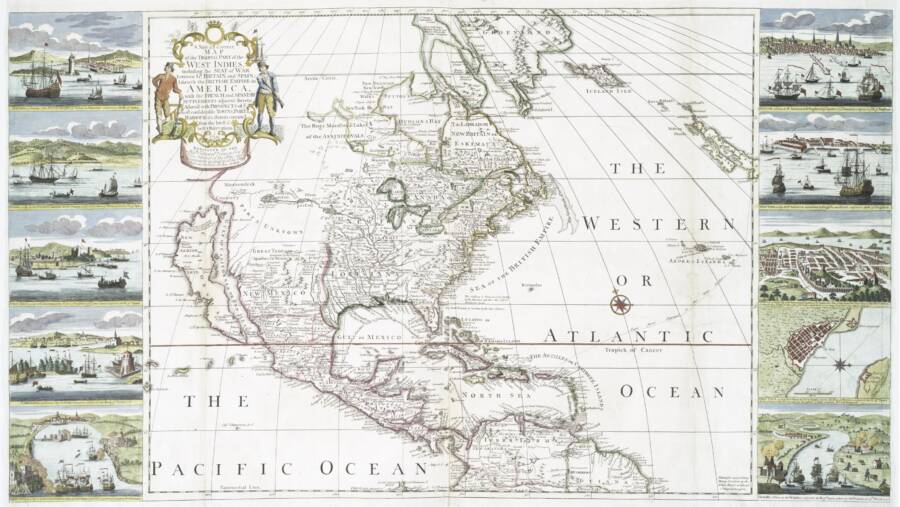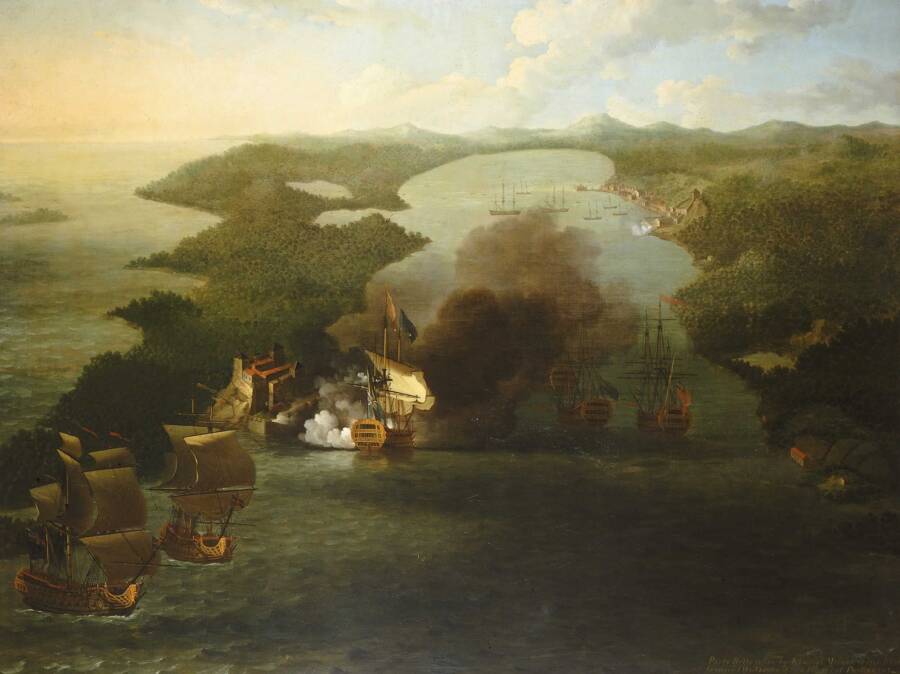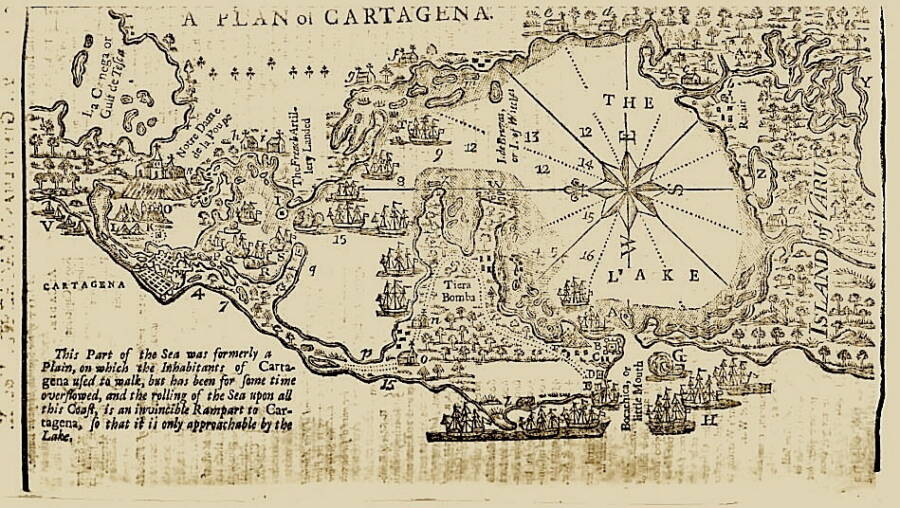In 1731, Spanish coast guards allegedly cut off the ear of British Captain Robert Jenkins, sparking enough outrage for Britain to go to war with Spain years later.

Anonymous/British MuseumA 1738 political cartoon of Robert Jenkins presenting Prime Minister Horace Walpole with his severed ear.
In the bitter rivalry between 18th-century Spain and England, the two powers fought over many things: royal succession, colonial boundaries, and even commercial squabbles. But between 1739 and 1742, they also fought over something quite strange: an ear.
Of course, the War of Jenkins’ Ear had much more nuanced causes than one severed ear. Indeed, it didn’t even get its name until more than a century later, when historian Thomas Carlyle coined the term in his biography of Frederick the Great of Prussia in 1858.
And although it did not produce any territorial change, the War of Jenkins’ Ear is nonetheless a fascinating story as one of the first global wars with action primarily in the colonies rather than Europe.
The Event That Triggered The War Of Jenkins’ Ear
The incident that would give the war its name happened in 1731, eight years before the fighting actually started.
Suspecting that the Rebecca, a ship skippered by Captain Robert Jenkins, was smuggling goods, the Spanish coast guard boarded the ship to search for contraband. After finding none, the Spanish officers allegedly resorted to violence to extort a confession.
According to Benjamin Franklin’s Pennsylvania Gazette, one officer “took hold of [Jenkins’] left Ear, and with his Cutlass slit it down; and then another of the Spaniards took hold of it and tore it off.”

Henry Overton/Library of CongressA 1741 map depicting the main theater of the War of Jenkins’ Ear.
The officer then allegedly handed Jenkins back his ear, telling him, “Go, and tell your King George that I will do the same to him if he dares to do the same as you.”
Tensions Between England And Spain Reach A Breaking Point
The altercation involving Jenkins’ ear didn’t register in the British political sphere until 1738, when two major issues that had been simmering for decades suddenly came to a boil.
On one hand, the Spanish king demanded back payments from British merchants for the “asiento de negros,” or the monopoly right to sell enslaved people to Spanish colonies in the Americas.
On the other hand, the British insisted on the right to free trade in the Caribbean and complained that Spanish naval forces suppressed legitimate British trade in the Americas. To England, the story of Jenkins’ ear symbolized Spanish ruthlessness in doing so.
In March 1738, Jenkins was ordered to appear before Parliament to share the story of his ear. Legend says that Jenkins had kept the amputated ear in a bottle over the years and brought it out as part of his presentation, though there’s no record of the hearing that confirms this.
Regardless, the story of Jenkins’ severed ear was perceived as an insult to the country’s honor — and Britain used this alleged incident to stir up support for a war against Spain.
After some failed efforts to settle matters diplomatically, England declared war against Spain on Oct. 23, 1739.

Samuel Scott/National Maritime MuseumAn 18th-century painting of Admiral Vernon’s shelling of Porto Bello in Panama.
As an English street ballad summed up, according to historian Robert Gaudi’s 2021 book The War of Jenkins’ Ear:
“Our Merchants and ears a strange bother have made,
with Losses sustained in their ships and their trade;
But now they may laugh and quite banish their fears,
Nor mourn for lost Liberty, riches, and ears.”
The Bloody War Over A Severed Ear
Led by Admiral Edward Vernon, the British achieved early success in November 1739 when they bombarded the Spanish fort at Porto Bello in modern-day Panama into submission.
The success energized British forces. Indeed, it directly inspired the song “Rule, Britannia,” which was first performed at a function celebrating the victory, according to the Wall Street Journal.
Over the next several years, the British continued to stage attacks on Spanish colonies in the Americas, many of which the Spanish repelled. The British, beset by internal dissension, poor strategy, and diseases like yellow fever, would gradually lose momentum.
And despite multiple attempts, they never managed to take Cartagena de Indias in modern-day Colombia, a major Spanish gold trading post.

Anonymous/Gentleman’s MagazineA 1740 map of Cartagena in the London publication Gentleman’s Magazine, which frequently commented on the war and its progress.
Robert Gaudi attributes this in large part to Don Blas de Lezo, the Spanish military commander at Cartagena, and his “tactical retreat” strategy.
“Delay the enemy long enough and moisture and mosquitos would wreak a carnage beyond the firepower of Spanish guns,” Gaudi wrote.
The Aftermath Of The War Of Jenkins’ Ear
The British would go on to try to attack Cuba in 1741, and Venezuela in early 1743, but withdrew both times with little to show for their efforts.
By the time the larger War of the Austrian Succession subsumed the War of Jenkins’ Ear in 1743, both sides had suffered thousands of casualties. Finally, in 1748, the fighting ended in a “status quo ante bellum”: No territory would change hands, and things would essentially return to how they were before the war began in 1739.
And for Robert Jenkins, who had his ear cut off?
He disappeared from the history books soon after the bloody war that bears his name.
After reading about the War of Jenkins’ Ear, investigate a colonial Spanish shipwreck off the coast of Cartagena de Indias. Then, read about Scotland’s miserable failure attempting to set up a colony in nearby Panama.





